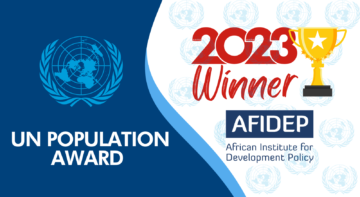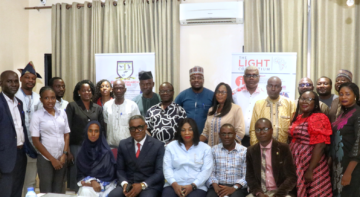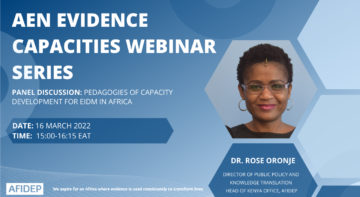Blogs

The African Institute for Development Policy (AFIDEP) conducted an interactive virtual training under the Enhancing Research Uptake and Policy Engagement in the DELTAS Programme (Enhance DELTAS) targeting PhD and post-doctoral early career researchers. The workshop, “Policy Engagement and Evidence Uptake for Early Career Researchers” sought to enhance participants’ skills and expand their knowledge and understanding of how to maximise research uptake and policy engagement. The training attracted 19 participants from across Africa, including; Kenya, South Africa, Nigeria, Namibia, Ethiopia, Tanzania and Ghana.
By the end of the training, participants were expected to: (i) understand the complexities of the policymaking processes; (ii) understand and describe the importance of evidence-informed decision-making (EIDM) for better health policies and programmes; (iii) develop a Policy Engagement Strategy; (iv) summarise research into policy briefs and other communication products for a non-academic audience.
Given the diversity in the expertise of the participants, the course began with a background to the EIDM process, followed by enhancing the understanding of the health policy-making landscape. The second half of the workshop focused on providing guidelines for developing a policy engagement strategy, providing knowledge on how research can be translated and lastly a practical session on packaging the knowledge for a non-technical audience. Most participants commended this session and suggested that more time be added for future sessions. In addition, pre-recorded videos and other self-learning materials were prepared and circulated to participants prior to the workshop to support the facilitator-led online learning. The workshop was highly interactive, combining presentations, discussions and group work supported by practical sessions and questions and answers. A guest speaker from the Malawi Ministry of Health was invited to share their lived experiences with evidence-use within policymaking spaces. More reflections on the training can be found in the testimonials below:
A participant noted: “I will work with the end in mind so that when I’m just thinking about the results and the publication I’ll have in a peer-reviewed journal but how I can translate these into a policy brief that can actually go out there and make a difference.”
Another participant said: “We need to collaborate with PhD and Masters students within different universities from the moment that students are having their orientation week. There is a need for a 5- or 10-minutes presentation on policy-related issues and how that can be shared. I think it will definitely help them in formulating some of their research questions and have a whole broad look at their research work. I feel challenged myself now when I was starting, I was just told you need to look at a policy-related issue that’s going to come out of your research work. But after going through this training, I’m able to really think in-depth of what are the best ways or processes I need to work on to make sense of my research work and reach out to primary audiences.”
Assessing the skills developed during the training
A pre-and post-training test was conducted using the Survey Monkey, in order to assess the efficacy of the training. The results showed that the level of knowledge among participants improved from 61% before training, compared to 81% at the end of the training. In addition to the pre-and post-survey assessment, the overall quality of the training was evaluated. Generally, the participants rated the quality of the training as very good (10 were female and 6 were male, while the remaining 3 participants did not take part). Similarly, the overall understanding of technical aspects improved by the end of the training, and some of the participants were interested in a follow-up mentorship to support their targeted study areas in relation to research uptake and policy engagement. The participants also suggested potential areas that they wish to cover in more details in their future training. Examples of these areas included; social media engagement, systematic review and meta-analysis and monitoring and evaluation of the policies.
What next?
At the end of the training, participants were asked to indicate if they would be interested in the mentorship programme to help them complete their policy products. Out of the 19 fellows, 9 expressed interest in being mentored to develop some evidence products. The mentorship programme is structured to allow for follow-up with participants with exercises and mentoring and technical support to consolidate the learning from the training and to enhance participants’ knowledge. In addition, participants will be assigned to mentors who will support them for up to the end of the programme to monitor their progress on the implementation of their policy engagements tasks. Each mentor-mentee pair will be required to complete an agreement document outlining the goals and expectations, and a plan for completing at least one evidence product for sharing with relevant policymakers. Each mentor is expected to submit updates every month for each mentee, as well as an end-of mentorship programme report, at the end. In addition, participants will have access to policy engagement and evidence uptake toolkits, and an opportunity to take part in follow-on webinars.
The second cohort of research fellows is scheduled to commence the “Policy Engagement and Evidence Uptake for Early Career Researchers” virtual workshop from 25 January 2021 to 26 January 2021.
Related Posts





